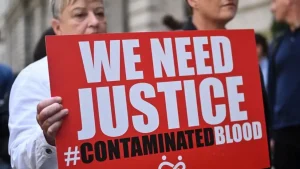What is the infected blood scandal?
What is the infected blood scandal?
The infected blood scandal refers to a dark chapter in the history of healthcare, where thousands of people were unknowingly infected with deadly...

What is the infected blood scandal?
The infected blood scandal refers to a dark chapter in the history of healthcare, where thousands of people were unknowingly infected with deadly viruses through contaminated blood products.
During the 1970s and 1980s, blood products such as Factor VIII were often made from pooled plasma from multiple donors, some of whom carried HIV and hepatitis viruses. This led to a widespread epidemic of HIV and hepatitis infections among hemophiliacs and other patients who relied on these blood products.
The scandal was exacerbated by the slow response of governments and healthcare organizations to the crisis, as well as the lack of proper screening and testing protocols for blood donations.
Many victims and their families have since been seeking justice and compensation for the harm caused by the infected blood scandal, as well as demanding accountability from the institutions responsible for allowing it to happen.
The scandal has had long-lasting repercussions on the healthcare system, leading to significant changes in blood donation and screening practices to ensure the safety of blood products in the future.
It serves as a reminder of the importance of transparency, accountability, and ethical responsibility in the healthcare industry, to prevent similar tragedies from occurring in the future.
The infected blood scandal has left a lasting impact on the lives of thousands of people who were affected by it, both physically and emotionally.
Efforts are ongoing to raise awareness about the infected blood scandal and to ensure that those affected receive the support and compensation they deserve.
Ultimately, the infected blood scandal serves as a cautionary tale about the consequences of negligence and lack of oversight in the healthcare system, and the need for vigilance to prevent such tragedies from happening again.






